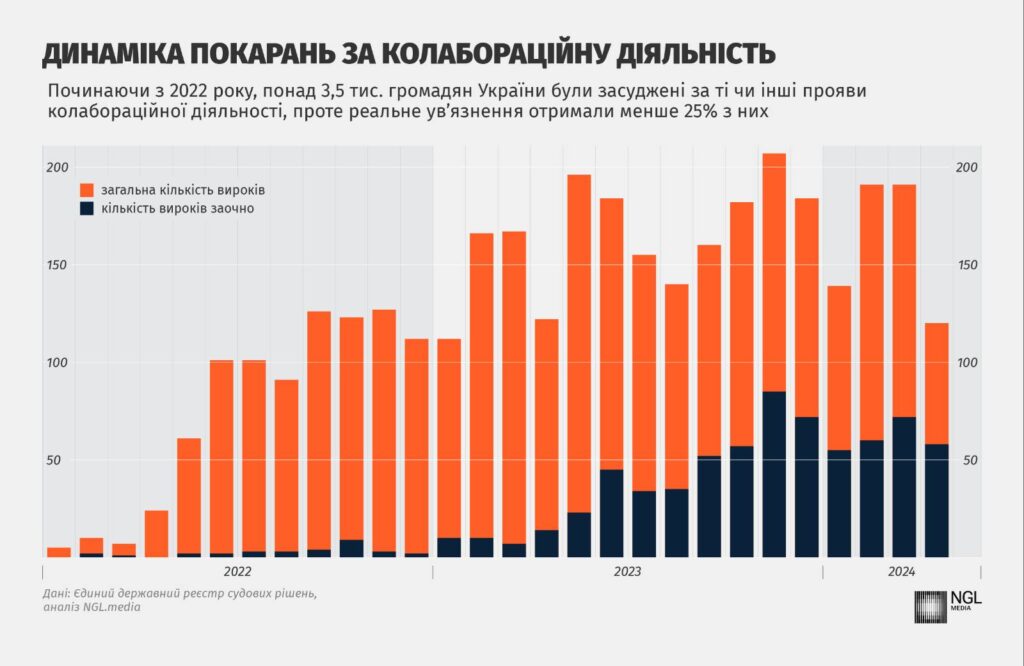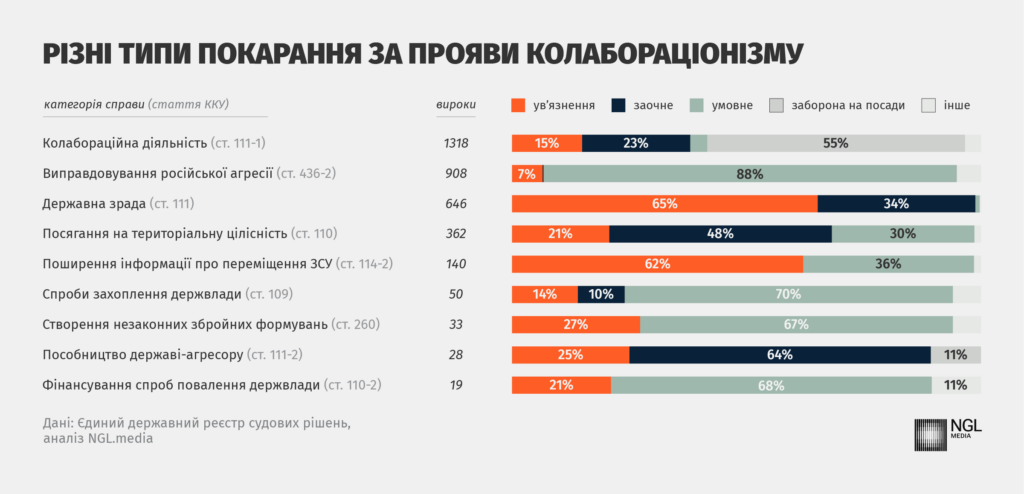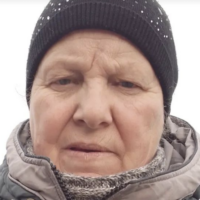In the spring of 2022, almost immediately after the full-scale Russian invasion, the Verkhovna Rada criminalized cooperation with the occupiers by including separate articles in the Criminal Code on collaboration, aiding and abetting, justifying aggression, spreading sensitive security information, and so on. The new articles, along with existing ones such as “High Treason,” were intended to punish alleged traitors and accommodate the public’s request for justice.
However, the analysis of court practice over the past two years shows otherwise. Hundreds of cases identified by NGL.media in the register of court decisions have the same elements of crime, but very different punishments – from extremely lenient to unjustifiably severe.
NGL.media analyzed more than three and a half thousand verdicts and came to the conclusion that some of the decisions of Ukrainian courts not only violate humanitarian law, but also provide for disproportionate punishments for violations.
Below you can see an interactive infographic with detailed information on each case.
***
One of the first people convicted of collaboration in 2022 was Oleksandr Bazyma, who worked as a stoker in a hospital boiler facility in the town of Buryn, Sumy region. For a little over a month, while the occupation of the town lasted, Oleksandr continued to come to the boiler facility every day, and to avoid lengthy checks at checkpoints, he arranged with the Russians to bring them water and cigarettes. Also, he once bought a SIM card for a Russian soldier’s phone at his request.
“These actions […] are qualified under Part 4 of Article 111-1 of the Criminal Code of Ukraine, as he committed collaboration activities, which was expressed in the transfer of material resources to the armed or paramilitary formations of the aggressor state,” the court said in its verdict, fining the stoker UAH 9,860 and banning him from working in state and local government agencies for 10 years.
Oleksandr Bazyma refused to give NGL.media comments on his verdict. At the same time, his colleagues say that thanks to his work, the hospital was able to operate under the occupation. They do not see any harm in the fact that he gave cigarettes to the occupiers.
According to lawyer Anastasia Serbina, as a result of the vaguely worded provisions of the Criminal Code, virtually everyone who lived in the city during the occupation may be subject to criminal liability.
“The new articles of the CCU contradict international humanitarian law, in particular Geneva Convention relative to the Protection of Civilian Persons in Time of War, which states: “The life of the civilian population should undergo minimal changes with the arrival of the occupier. These conventions establish categories of protected persons and jobs, including administrative positions that ensure the operation of hospitals,” explains Anastasia Serbina in a conversation with NGL.media.
The lawyer also emphasizes that the Criminal Code cannot contradict the norms of international law, as international treaties are superior – this is stated in the Criminal Code. Still, it is difficult to prove this in practice.
One crime – different sentences
In March 2023, SBU operatives detained Yurii Chernyshov, 81, a retired colonel and resident of Zhytomyr, near the Belarusian border. For over a year, he had been passing on information about the location and movement of the Armed Forces of Ukraine to the Wagnerites The Wagner Private Military Company, PMC Wagner, is a Russian private military company staffed by mercenaries and convicted criminals. It was an active participant of the invasion of Ukraine.
“He tracked the location, type, number and movement of military units and military equipment of the Armed Forces of Ukraine, took pictures of the location of strategically important military facilities […] using the Telegram mobile application during 22. 09.2022 to 21.02.2023, he communicated with a representative of the Wagner PMC and passed on the information he had collected to the latter”, reads the verdict, which sentenced Yuriy Chernyshov to 15 years in prison with confiscation for high treason (part. 2 of Art. 111 of the CCU).
The Russians recruited Chernyshov back in July 2022 through the Russian social network VKontakte, which is banned in Ukraine. It turned out to be easy. He answered the first question, “How do you feel about what is happening in Ukraine now,” with a “Wagnerian” response: “As a reckoning for all the mistakes of the government that we elected through stupidity.” Chernyshov also assured his recruiter that he only watched Russian programs and official websites of “prygozhin, surovikin, putin,” the verdict reads.
Konstantin Vanin, a 35-year-old physics teacher from Sloviansk, was engaged in the same activities as Chernyshov. However, he was sentenced to only eight years, under a different article – Art.114-2 of the Criminal Code (spreading information about the movement of the Armed Forces). At the same time, unlike Chernyshov, the information Vanin passed on had specific and dire consequences – the Russians launched several missile strikes (one, two, three) at schools where, according to Vanin, the Armed Forces were located.
In an interview given after the verdict, he denied any involvement in the attacks, and explained the lenient sentence by saying that he “made a deal with the investigation”. According to Vanin, all his relatives have moved to Russia, and he will go there himself as soon as he is released from prison.
Who can be punished
“There are many cases when we see that the same situation is interpreted differently by different pre-trial investigation bodies. This means that we do not have the principle of legal certainty, i.e. the text of the law is unclear,” comments the lawyer Anastasia Serbina.
This leads to uncertainty as to which activities should be considered collaboration. For example, the Ministry of Health clarified back in September 2022 that under no circumstances can doctors’ work be considered collaboration.
“In reality, you won’t find a case where a doctor is prosecuted for collaboration. Сhief doctors who perform administrative functions are an exception, but the Ministry of Health also warned about this. It turns out that the article [of the Criminal Code] is poorly worded, but the institution’s policy has solved this problem,” the lawyer explains.
However, the situation with educators is more complicated: the article on collaboration activities separately provides for punishment for propaganda in educational institutions, as well as for “Ukrainian citizens’ actions aimed at implementing educational standards of the aggressor state. This means that not only school principals can be punished, but theoretically even physics or chemistry teachers, since the Russians converted all schools in the occupied territory to their own educational standards.
Formally, this is punishable by severe penalties – up to three years in prison and a ban on holding certain positions for 10 to 15 years. Those who hold senior positions in educational institutions (regardless of ownership) face up to 10 years in prison.
However, in practice, it is not so scary. For example, in August 2023, a Lviv court found Victoria Sukhykh, the head teacher of a Horlivka school, guilty of collaboration, but replaced her actual imprisonment with two years of probation.
“She voluntarily agreed to cooperate with the occupation authorities of the Russian Federation and accepted the offer to take the position of deputy director for educational work, while teaching Russian language and literature and being a class teacher of the 8th grade,” the text of the verdict says, citing specific examples of collaboration, including publications about the day of “Russia’s reunion with Crimea” or the conditions of the short story competition “For the Motherland” or the approval of paying teachers’ salaries in Russian rubles.
The verdicts analyzed by NGL.media show that the most severe punishments are imposed on those educators who are sentenced in absentia (i.e. in the absence of the accused). For instance, the case of a teacher at the Novoaidar Lyceum who campaigned among children and parents for studying under Russian programs and was sentenced to 2.5 years in prison. However, she still needs to be detained to execute the sentence, and is currently only on the wanted list.
Overall, one in five verdicts in cases involving national security are passed without the participation of the defendants.
To go to jail for likes
An illustrative case occurred in Pryluky, where in September 2023, a local court sentenced a pensioner Domnika Kireeva to five years in prison. The 61-year-old woman is currently serving her sentence in a penal colony under Art. 436-2 of the Criminal Code (“Justification of the armed aggression of the Russian Federation”). The basis for this sentence were several posts by Kireeva on Odnoklassniki published in the spring of 2022, which approved the Russian invasion of Ukraine.
In court, she pleaded guilty and repented, claiming that she had previously been influenced by Russian political TV shows, but now supports Ukraine.
“Given the woman’s age and health, and the fact that her actions did not have serious consequences, I was surprised by the verdict. We filed an appeal, but the court upheld the verdict. As a human being and a defense lawyer, I do not understand why,” Oleksandr Basenko, Kireeva’s lawyer, told NGL.media.
At the same time, during the appeal hearing, he was forced to take the convict out into the corridor, because when asked directly by the judge “What do you dislike about Ukraine?” Domnika Kireeva decided to answer in great detail. “The lady started complaining about pensions and the treatment of the elderly. This, of course, did not help her in this situation,” the lawyer recalls.
On the opposite, Valentyn Voroshylov from Kamianske Kamianske (formerly Dniprodzerzhynsk), a city in the Dnipropetrovsk oblast who also published several anti-Ukrainian posts on Odnoklassniki social network in the spring of 2022, remained virtually unpunished. The local court found him guilty of collaboration, but only punished him with a ban “to use Russian resources and social networks blocked on the territory of Ukraine in any way for the period of 10 years”. The court did not specify in its verdict how this sentence will be enforced.
Pressure on judges and lawyers
Collaboration cases can be investigated by the Security Service of Ukraine, the National Police, and the State Bureau of Investigations. Depending on the investigators’ workload or other specifics, they may transfer these cases between agencies. According to last year’s analysis by the ZMINA Human Rights Center, there were no cases of threats or pressure on law enforcement officers processing such cases. Instead, it is mainly lawyers who face this.
Khrystyna Vraschuk works as a lawyer and defends Russian military personnel and collaborators in court. She is one of about 200 lawyers provided by the state to those accused of crimes against national security through the system of free legal aid.
“I know colleagues who refuse to take on such cases. They are affected by social pressure, because the society identifies the defense lawyer with the accused. People want blood, they are tired and offended. But in fact, the law is the law. We, like doctors, being a state governed by the rule of law, are obliged to provide legal aid to everyone. This is guaranteed by our Constitution,” Khrystyna Vraschuk explains to NGL.media.
Anastasia Serbina also talks about public pressure as a problem for judges and lawyers.
“We have a stigma that all those who remained under occupation are ‘waiting for the Russian world’, they are to blame, and so on… This is a shift of responsibility from the occupier to the civilian population. In addition, there is political pressure. We had a case when a judge did not grant a motion to arrest a collaborator and released her. Then this collaborator left. And what happened? The judge was accused of helping the person to leave the country. But it was not the judge who was to blame, but the State Border Guard Service. Knowing about the travel ban, they let her through,” Serbina explains.
Author Mariana Verbovska, editor Oleh Onysko, infographics by Nazar Tuziak, cover by Rostyslav Abramets






